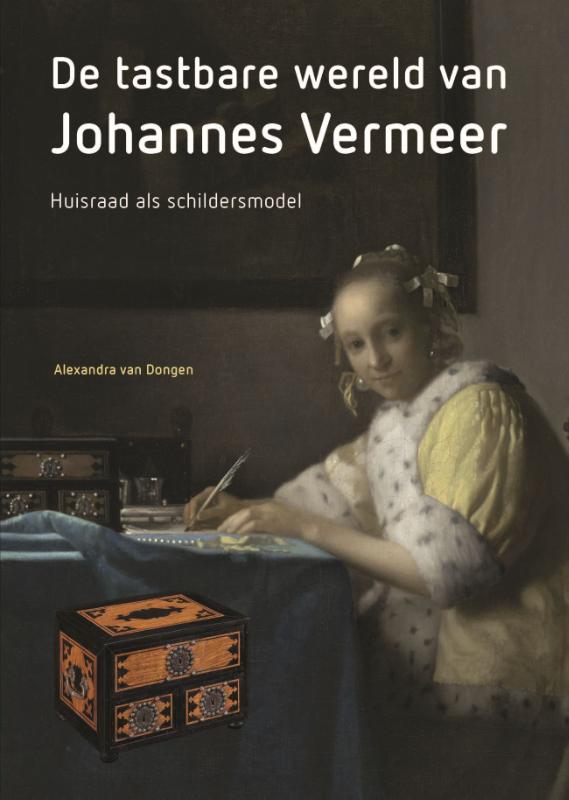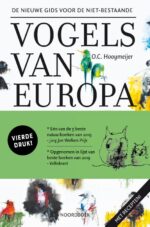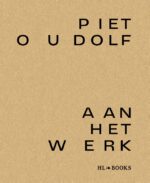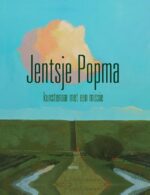De tastbare wereld van Johannes Vermeer
€ 29,90
De befaamde Delftse schilder Johannes Vermeer (1632-1675) beeldde uiteenlopende huiselijke gebruiksvoorwerpen af in zijn schilderijen: van een eenvoudig wilgentenen broodmandje tot een kostbaar Indo-Portugees juwelenkistje gemaakt van teak- en ebbenhout. Nooit eerder zijn overgeleverde voorbeelden van zeventiende-eeuws huisraad, zoals het uiterst realistisch en bijna tastbaar in Vermeers werk figureert, in één publicatie bijeengebracht. Nauwkeurige identificatie van zowel functioneel als decoratief huisraad, zoals kooken keukengerei, schenk- en drinkgerei (glaswerk, bestek), meubilair (stoelen, tafels), en specifieke door Vermeer uitgebeelde objecten zoals een koperen kroonluchter, zilveren inktstel, muntgewichtdoos, toiletgerei, sieraden en oosterse tapijten, biedt een verrassend perspectief op de ontstaansgeschiedenis van zijn oeuvre.
Recent onderzoek door kunsthistorica Alexandra van Dongen richt onze blik zo op de materiële objecten in Vermeers voorstellingen, die ze verbindt met voorbeelden van overgeleverde huisraad uit de tijd van Vermeer. Haar onderzoek is onderdeel van een langlopend project genaamd ALMA: Art Linked to Material Artefacts bij Museum Boijmans Van Beuningen in Rotterdam.
Alexandra van Dongen (Leiden 1961) is conservator historische vormgeving van Museum Boijmans Van Beuningen in Rotterdam. In 2022 publiceerde ze haar boek Dichter bij Vincent. Alledaagse voorwerpen in het werk van Vincent van Gogh, waarmee ze in 2024 de Mr. J.W. Frederiksprijs won.
Gerelateerde boeken
-
De nieuwe gids voor de niet-bestaande vogels van Europa
€ 22,90Na het verschijnen in 2013 van De Kleine Gids voor de niet-bestaande Vogels van Europa is kunstenaar en amateurornitholoog O.C. Hooymeijer onverdroten doorgegaan met het speuren naar niet-bestaande vogels. Veldreizen naar het uiterste noorden van Rusland, tot in het diepe zuiden van de mediterrane landen hebben geleid tot de ontdekking van bijna vijftig nieuwe specimen, alle zeer nauwkeurig beschreven en verbeeld.
Voor het onderzoek naar de bij de ontdekte vogels behorende ‘Volkswijsheden’ heeft de schrijver vele tandeloze, zeer bejaarde bewoners van veelal het platteland geïnterviewd, teneinde de vaak bijna in vergetelheid geraakte spreuken te kunnen behouden voor het nageslacht.
Voor de in deze nieuwe Gids opgenomen ´Recepten met niet-bestande vogels’ heeft O.C. Hooymeijer bovendien vele culinair specialisten geraadpleegd en tientallen archieven en bibliotheken verspreid over heel Europa bezocht. -
Zeven eeuwen Allersmaborg
€ 32,50Zeven eeuwen Allersmaborg
Annette van der Post en Henk Th. van VeenVerscholen tussen de bomen in het Reitdiepdal bij Ezinge ligt de historische borg Allersma. Een statig maar sober gebouw met een lange en rijke geschiedenis, die in dit boek voor het eerst wordt beschreven.
Zeven eeuwen Allersmaborg schetst de levens van voorname Ommelander families die er permanent woonden en van Groninger regenten die in stadpaleizen resideerden en Allersma koesterden als hun buitenverblijf. Veel markante eigenaars en bewoners vanaf de middeleeuwen tot de twintigste eeuw passeren de revue: jonkheren, notarissen, gepensioneerde boeren en kunstenaars.
In de tweede helft van de twintigste eeuw ontwikkelde Allersma zich tot een artistieke broedplek door de gastvrijheid van het kunstenaarsechtpaar Martin Tissing en Annie Vriezen. Nationaal en internationaal opererende kunstenaars laafden zich er aan de betoverende atmosfeer. -




